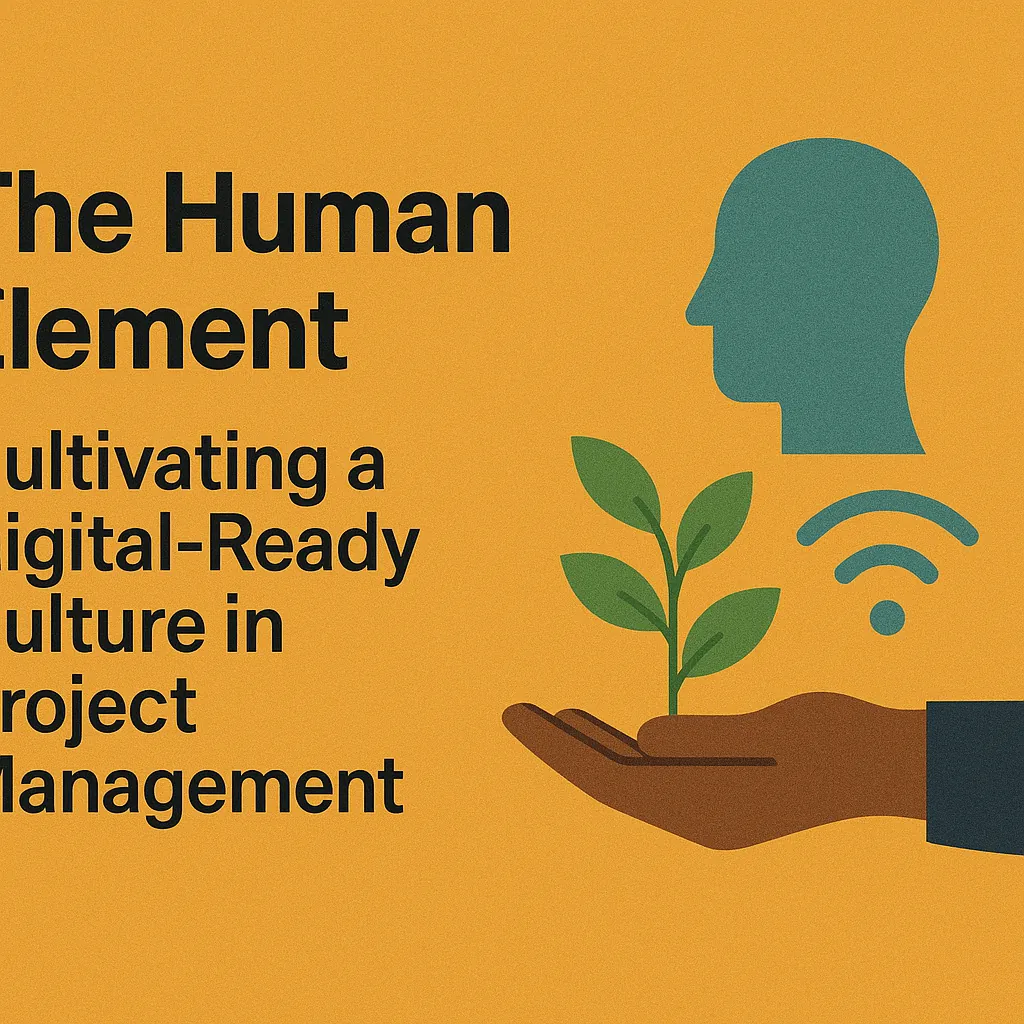Introduction: The Intersection of Digital Transformation and Culture
Digital transformation has emerged as a critical initiative for organizations seeking to enhance their operational efficiency, improve customer experiences, and maintain competitive advantage. Digital transformation refers to the integration of digital technology into all areas of a business, fundamentally changing how organizations operate and deliver value to customers. This transformation is not merely about adopting new technologies; it encompasses a holistic shift in processes, mindsets, and organizational structures that can significantly influence project outcomes.
Organizational culture plays a pivotal role in the success of digital transformation initiatives. Culture encompasses the shared values, beliefs, and behaviors that shape how employees interact and work together. A strong, adaptive culture can facilitate the acceptance of new technologies and processes, while a rigid or misaligned culture can hinder progress and lead to project failures. Research indicates that organizations with a positive culture are more likely to achieve their digital transformation goals, as employees feel empowered to embrace change and innovate.
HR professionals and project managers are at the forefront of cultivating a digital-ready culture. Their roles are crucial in fostering an environment that encourages collaboration, continuous learning, and agility. HR professionals can implement training programs that equip employees with the necessary digital skills and promote a mindset open to change. Meanwhile, project managers can lead by example, demonstrating how to leverage digital tools effectively and encouraging teams to adopt new practices that align with the organization’s transformation goals.
Understanding Digital Transformation
Digital transformation is a comprehensive and strategic shift that organizations undertake to leverage technology, enhance processes, and empower people. In the context of project management, understanding the components of digital transformation is crucial for HR professionals and project managers aiming to cultivate a digital-ready culture. Here are the key components and insights into the benefits and examples of successful initiatives.
Components of Digital Transformation
Technology:
- At the heart of digital transformation is the adoption of advanced technologies such as cloud computing, artificial intelligence, big data analytics, and the Internet of Things (IoT). These technologies enable organizations to streamline operations, improve decision-making, and enhance customer experiences.
- For project managers, integrating these technologies into project workflows can lead to more efficient resource allocation, real-time data access, and improved collaboration among team members.
Processes:
- Digital transformation involves re-evaluating and redesigning business processes to be more agile and responsive. This may include automating repetitive tasks, implementing agile methodologies, and utilizing project management software that supports remote collaboration.
- By optimizing processes, organizations can reduce time-to-market for projects, enhance productivity, and improve overall project outcomes.
People:
- The human element is critical in digital transformation. Organizations must invest in training and development to equip employees with the necessary skills to thrive in a digital environment. This includes fostering a culture of continuous learning and adaptability.
- Engaging employees in the transformation process ensures that they are not only receptive to change but also active participants in driving innovation and improvement.
Potential Benefits of Digital Transformation
- Increased Efficiency: By automating processes and utilizing data analytics, organizations can significantly reduce operational costs and improve efficiency. This leads to faster project delivery and better resource management.
- Enhanced Customer Experience: Digital transformation allows organizations to better understand customer needs through data insights, enabling them to tailor products and services accordingly. This can lead to higher customer satisfaction and loyalty.
- Improved Decision-Making: Access to real-time data and analytics empowers project managers to make informed decisions quickly, reducing risks and enhancing project success rates.
- Competitive Advantage: Organizations that successfully implement digital transformation can differentiate themselves in the market, attracting new customers and retaining existing ones through innovative solutions and improved service delivery.
Examples of Successful Digital Transformation Initiatives
- General Electric (GE): GE has embraced digital transformation by integrating IoT technology into its industrial operations. The company developed the Predix platform, which collects and analyzes data from industrial machines, leading to improved efficiency and predictive maintenance.
- Nike: Nike has successfully transformed its supply chain and customer engagement through digital initiatives. By leveraging data analytics and e-commerce platforms, Nike has enhanced its direct-to-consumer sales and personalized marketing strategies.
- Coca-Cola: Coca-Cola implemented a digital transformation strategy that included the use of AI and machine learning to optimize its marketing campaigns and improve customer interactions. This initiative has resulted in increased sales and a stronger brand presence in the digital space.
The Role of Culture in Digital Transformation
The success of digital transformation initiatives is increasingly recognized as being heavily influenced by organizational culture. A digital-ready culture is not merely a backdrop; it is a critical component that can either propel or hinder transformation efforts. Below, we explore what constitutes a digital-ready culture, the characteristics of supportive versus resistant cultures, and real-world case studies that illustrate the profound impact of culture on digital transformation outcomes.
Defining a Digital-Ready Culture
A digital-ready culture is characterized by several key attributes:
- Agility and Flexibility: Organizations that embrace change and adapt quickly to new technologies and processes are better positioned for successful digital transformation. This agility allows teams to pivot in response to market demands and technological advancements.
- Collaboration and Open Communication: A culture that fosters collaboration across departments encourages knowledge sharing and innovation. Open communication channels help in breaking down silos, enabling teams to work together effectively on digital initiatives.
- Emphasis on Continuous Learning: Organizations that prioritize learning and development create an environment where employees feel empowered to acquire new skills and adapt to digital tools. This commitment to growth is essential for keeping pace with rapid technological changes.
- Customer-Centric Mindset: A digital-ready culture places the customer at the center of its strategies. Understanding customer needs and leveraging digital tools to enhance customer experiences is crucial for successful transformation.
Supportive vs. Resistant Cultures
The characteristics of supportive and resistant cultures can significantly influence the trajectory of digital transformation projects:
Supportive Cultures:
- Encouragement of Innovation: Employees are motivated to experiment with new ideas and technologies without fear of failure.
- Leadership Buy-In: Leaders actively champion digital initiatives, providing the necessary resources and support.
- Inclusivity: Diverse perspectives are valued, leading to more comprehensive solutions and a greater sense of ownership among employees.
Resistant Cultures:
- Fear of Change: Employees may be apprehensive about adopting new technologies, leading to pushback against transformation efforts.
- Siloed Departments: Lack of collaboration can result in fragmented efforts, where departments work in isolation rather than as a cohesive unit.
- Limited Vision: A narrow focus on traditional practices can stifle innovation and hinder the adoption of digital solutions.
Key Cultural Attributes for a Digital-Ready Organization
During digital transformation initiatives, the cultural landscape of an organization plays a pivotal role in determining success. As HR professionals and project managers navigate this complex terrain, understanding and cultivating specific cultural attributes can significantly enhance the effectiveness of digital transformation efforts. Here are some key cultural attributes that support a digital-ready organization:
1. Agility and Adaptability
- Embracing Change: A digital-ready culture thrives on agility, allowing project teams to respond swiftly to changes in technology, market demands, and customer expectations. Organizations that foster an environment where team members are encouraged to pivot and adapt their strategies are better positioned to leverage new digital tools and methodologies.
- Flexible Mindsets: Encouraging a mindset that values flexibility helps teams to experiment with new ideas and approaches without the fear of failure. This adaptability is crucial in a digital landscape where innovation is constant and rapid.
2. Collaboration and Communication
- Breaking Down Silos: Effective collaboration is essential for digital transformation. Organizations must promote cross-functional teamwork, where project managers, IT specialists, and HR professionals work together seamlessly. This collaboration not only enhances problem-solving but also fosters a sense of shared purpose.
- Open Communication Channels: Establishing transparent communication channels is vital for sharing information and insights across teams. Regular check-ins, feedback loops, and collaborative tools can facilitate ongoing dialogue, ensuring that everyone is aligned and informed about project goals and progress.
3. Continuous Learning and Innovation
- Lifelong Learning Culture: A commitment to continuous learning is a hallmark of a digital-ready organization. Encouraging employees to pursue professional development opportunities, attend workshops, and engage in online courses can help them stay abreast of the latest digital trends and technologies.
- Fostering Innovation: Organizations should create an environment that encourages experimentation and innovation. This can be achieved by allocating time for creative projects, recognizing and rewarding innovative ideas, and providing resources for teams to explore new technologies and methodologies.
Strategies for Cultivating a Digital-Ready Culture
The significance of organizational culture cannot be overstated. A digital-ready culture is essential for ensuring that teams are not only equipped with the necessary skills but are also motivated and aligned with the digital vision of the organization. Here are actionable strategies for HR professionals and project managers to foster such a culture:
1. Assessing Current Organizational Culture
Understanding the existing culture is the first step toward cultivating a digital-ready environment. Here are some steps to effectively assess the current organizational culture:
- Conduct Surveys and Interviews: Utilize tools like employee surveys and one-on-one interviews to gather insights about employees’ perceptions of the current culture. Focus on areas such as openness to change, innovation, and technology adoption.
- Analyze Communication Patterns: Observe how information flows within the organization. Are there silos that hinder collaboration? Identifying these patterns can help pinpoint areas that need improvement.
- Evaluate Leadership Styles: Assess how leaders within the organization promote or hinder a digital mindset. Leadership plays a crucial role in shaping culture, and understanding their approach can provide insights into necessary changes.
2. Training and Development Programs
To enhance digital skills across the organization, targeted training and development programs are essential. Consider the following approaches:
- Digital Literacy Workshops: Implement workshops that focus on essential digital skills, such as data analytics, digital tools, and software relevant to the industry. Tailor these workshops to different levels of expertise to ensure inclusivity.
- Mentorship Programs: Pair less experienced employees with digital-savvy mentors. This not only facilitates knowledge transfer but also fosters a sense of community and support within the organization.
- Continuous Learning Opportunities: Encourage a culture of continuous learning by providing access to online courses, webinars, and industry conferences. This can help employees stay updated on the latest digital trends and technologies.
3. Encouraging Open Communication and Collaboration
A culture that promotes open communication and collaboration is vital for successful digital transformation. Here are methods to enhance these aspects:
- Implement Collaborative Tools: Utilize digital collaboration tools such as Slack, Microsoft Teams, or Asana to facilitate communication across teams. These platforms can help break down silos and encourage real-time collaboration.
- Regular Feedback Mechanisms: Establish regular feedback loops where employees can share their thoughts on digital initiatives and suggest improvements. This can be done through town hall meetings, suggestion boxes, or digital forums.
- Celebrate Successes and Learn from Failures: Create an environment where successes are celebrated, and failures are viewed as learning opportunities. Recognizing achievements can motivate teams, while discussing setbacks can foster resilience and innovation.
By implementing these strategies, HR professionals and project managers can cultivate a digital-ready culture that not only supports digital transformation but also enhances overall organizational effectiveness. Emphasizing the human element in this process is crucial, as it ensures that employees feel valued and engaged in the journey toward digital maturity.
Overcoming Resistance to Change
Digital transformation is a critical initiative for organizations aiming to enhance efficiency, improve customer experiences, and stay competitive in a rapidly evolving market. However, the journey towards digital transformation is often met with resistance from employees and stakeholders. Understanding the human element and cultivating a digital-ready culture is essential for successful project management in this context. Here are some key points to consider when addressing resistance to change during digital transformation initiatives.
Common Sources of Resistance to Digital Transformation
- Fear of the Unknown: Employees may feel anxious about new technologies and processes, fearing that they will not be able to adapt or that their jobs may be at risk. This fear can lead to reluctance in embracing change.
- Lack of Trust in Leadership: If employees do not trust the motives behind the digital transformation or the capabilities of leadership, they may resist changes. Transparency and clear communication are vital to building trust.
- Inadequate Training and Support: Resistance can stem from a lack of proper training and resources to help employees navigate new systems. Without adequate support, employees may feel overwhelmed and unprepared.
- Cultural Misalignment: An organizational culture that is not aligned with digital transformation goals can create friction. If the existing culture values traditional methods over innovation, employees may resist new approaches.
Strategies for Managing Change and Building Stakeholder Buy-In
- Engage Stakeholders Early: Involve key stakeholders in the planning and implementation phases of the digital transformation. This inclusion fosters a sense of ownership and can help mitigate resistance.
- Communicate Clearly and Frequently: Maintain open lines of communication throughout the transformation process. Regular updates about the goals, benefits, and progress of the project can help alleviate fears and build confidence.
- Provide Comprehensive Training: Offer training programs that equip employees with the necessary skills to adapt to new technologies. Tailored training sessions can address specific concerns and enhance competence.
- Highlight Benefits and Success Stories: Share success stories from other organizations or departments that have successfully undergone digital transformation. Demonstrating tangible benefits can motivate employees to embrace change.
- Create a Supportive Environment: Foster a culture that encourages experimentation and learning. Providing a safe space for employees to voice concerns and ask questions can reduce anxiety and resistance.
Measuring the Impact of Culture on Digital Transformation Success
The human element plays a pivotal role. A culture that embraces change, innovation, and collaboration is essential for the success of any digital transformation initiative. This section will explore how to measure the impact of culture on digital transformation success, focusing on key performance indicators (KPIs), the significance of feedback loops, and real-world examples of organizations that effectively track cultural impacts.
Key Performance Indicators (KPIs) Related to Culture and Digital Transformation
To evaluate the effectiveness of cultural initiatives in digital transformation, organizations can implement specific KPIs that reflect both cultural health and transformation progress. Some relevant KPIs include:
- Employee Engagement Scores: High engagement levels often correlate with a culture that supports digital initiatives. Regular surveys can gauge employee sentiment towards digital tools and processes.
- Adoption Rates of Digital Tools: Tracking how quickly and effectively employees adopt new technologies can indicate cultural readiness for change. This can be measured through usage statistics and training completion rates.
- Innovation Metrics: The number of new ideas generated, projects initiated, or improvements made can reflect a culture that encourages innovation. Metrics such as the percentage of employees participating in innovation programs can be insightful.
- Collaboration and Communication Metrics: Tools that facilitate collaboration (like project management software) can be monitored for usage patterns, indicating how well teams are working together in a digital environment.
These KPIs provide a quantitative basis for assessing cultural initiatives and their alignment with digital transformation goals.
Importance of Feedback Loops and Continuous Improvement
Feedback loops are crucial in measuring the impact of culture on digital transformation. They allow organizations to gather insights from employees about their experiences with digital tools and processes. This feedback can be used to:
- Identify Barriers: Understanding employee challenges can help organizations address cultural resistance and improve the adoption of digital initiatives.
- Enhance Training Programs: Continuous feedback can inform the development of training programs that better meet the needs of employees, ensuring they feel equipped to engage with new technologies.
- Foster a Culture of Openness: Encouraging feedback creates an environment where employees feel valued and heard, which can enhance overall morale and commitment to digital transformation efforts.
By establishing a culture of continuous improvement, organizations can adapt their strategies based on real-time insights, leading to more effective digital transformation outcomes.
Examples of Organizations Tracking Cultural Impact on Project Outcomes
Several organizations have successfully integrated cultural metrics into their digital transformation strategies, demonstrating the tangible benefits of a strong cultural foundation:
- Microsoft: The tech giant has implemented a culture of feedback and continuous learning, using employee engagement surveys to measure the impact of its digital initiatives. By focusing on a growth mindset, Microsoft has seen significant improvements in project outcomes and innovation.
- IBM: IBM tracks cultural metrics through its “IBM Culture Assessment,” which evaluates employee perceptions of collaboration, innovation, and adaptability. This data informs their digital transformation strategies, ensuring alignment with cultural values.
- Salesforce: Known for its strong emphasis on company culture, Salesforce regularly assesses employee satisfaction and engagement related to digital tools. Their commitment to a positive culture has led to high adoption rates of their cloud-based solutions, directly impacting project success.
These examples illustrate how organizations can effectively measure and leverage cultural impact to enhance their digital transformation efforts. By focusing on KPIs, fostering feedback loops, and learning from successful case studies, HR professionals and project managers can cultivate a digital-ready culture that drives transformation success.
Conclusion: The Future of Project Management in a Digital World
As we navigate the complexities of digital transformation, it becomes increasingly clear that the success of these initiatives hinges not just on technology, but significantly on the culture within organizations. A digital-ready culture is essential for fostering an environment where innovation can thrive and where teams are empowered to embrace change. Here are the key takeaways regarding the importance of culture in project management:
- The Role of Culture in Digital Transformation: A digital-ready culture is foundational for successful digital transformation. It encourages adaptability, collaboration, and a willingness to experiment with new technologies and processes. Organizations that cultivate such a culture are better positioned to respond to market changes and leverage digital tools effectively, leading to improved project outcomes.
- Prioritizing Cultural Initiatives: HR professionals and project managers must prioritize cultural initiatives that support digital transformation. This includes investing in training programs that enhance digital skills, promoting open communication, and fostering a mindset that values continuous learning. By doing so, organizations can create a workforce that is not only skilled in digital tools but also motivated to use them creatively and effectively.
- Evolving Landscape of Project Management: The landscape of project management is evolving rapidly in the context of digital transformation. Traditional methodologies are being supplemented or replaced by agile practices that emphasize flexibility and responsiveness. As project managers adapt to these changes, they must also consider how to integrate cultural elements that support these new approaches. This includes recognizing the importance of team dynamics, stakeholder engagement, and the need for a shared vision that aligns with digital goals.
In conclusion, as we look to the future of project management in a digital world, it is evident that culture will play a pivotal role in shaping successful outcomes. By fostering a digital-ready culture, organizations can not only enhance their project management practices but also ensure that they remain competitive in an increasingly digital landscape. Embracing this cultural shift is not just beneficial; it is essential for thriving in the future of work.
Find out more about Shaun Stoltz https://www.shaunstoltz.com/about/.
This post was written by an AI and reviewed/edited by a human.



